TODAY’S READING FROM THE OLD TESTAMENT- ESTHER 4:1-7:10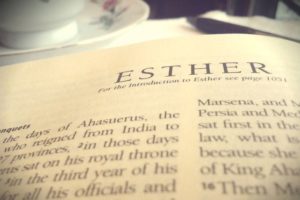
In the first three chapters of the Book of Esther, we are introduced to the setting (Susa, the magnificent winter capital of the Persian Empire), the main characters (Xerxes, Vashti, the Counselors, Mordecai, Hadassah/Esther, Haman) and his Anti-Semitic plot of to exterminate the entire Jewish population on the 13th of Adar.
In a host of seemingly ‘accidental’ happenstances, Queen Vashti is banished from the King; Hadassah, the Jewish orphan, under the care of her cousin Mordecai, is taken captive against her will into the Palace of Women. She is confronted with the prospect of being separated forever from loved ones, to be chosen by the King, to be his queen, or otherwise to spend her lifetime confined to the House of Concubines. She ‘happens’ to be shown favor by the King’s eunuchs and attendants and chosen by the King to be his new bride, Queen Esther. “The king loved her more than all the women, and she found favor and kindness with him more than all the virgins” (Esther 2:17). 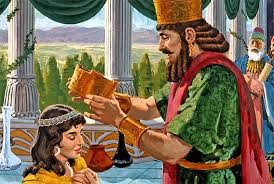
Her cousin Mordecai ‘happens’ to discover an assassination plot being arranged by two men who guarded the king’s door. Mordecai’s discovery of this pernicious attempt on the King’s life is reported to Esther, who in turn warns the King. The would-be assassins, Bigthan and Teresh, are found guilty of conspiracy to murder the Emperor and are executed on the gallows. Mordecai’s saving act is recorded in the official Chronicles, but he is not publicly recognized or rewarded for the deed. Instead, Haman, a descendant of King Agag and the Amalekites with whom God declared war (Exodus 17:16) seems to take the credit for exposing the plot and is promoted as Grand Vizier. All citizens are ordered to bow to him. But Mordecai, a Benjamite, will not bow, knowing Haman’s true identity and motive.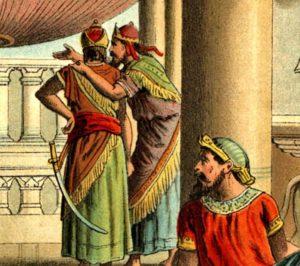
The author of the Book emphasizes the ancestral background of both Haman and Mordecai. Haman is a descendant of the Amalek King Agag and Mordecai is a descendant of the Israeli King Saul of the tribe of Benjamin. Each was a thorn in the side of the other. The Amalekites attacked the weak, the elderly, women and children of Israel who straggled behind as the newly formed nation made its way through the wilderness (Deuteronomy 25:17). King Saul, through disobedience, failed to be God’s instrument in bringing judgment upon the house of Agag (1 Samuel 15). As a result, Agag’s descendant, Haman, revives the Satanic strategy to utterly destroy the Jewish people (the seed of Promise) throughout the world.
Haman chooses a day that he believes would be favorable to his cause of annihilating the Jews and pleasing to ‘the ahuras’, the Zoroastrian gods of Persia. He does this by casting the ‘pur’ (plural form is ‘purím’- meaning, ‘lots’). The lots fall on the 13th day of the 12th month, 11 months in the future. Haman goes to the king to get permission to kill the Jews, but he does it in such a way as to keep hidden the identity of these people whom he claims are a threat to the security of the Persian Empire. Xerxes wants to be spared of the details and passively gives Haman his royal signet ring with permission to do as he pleases. Haman then issues the command that, on the 13th of Adar, citizens of Persia were to destroy, kill and annihilate all the Jews.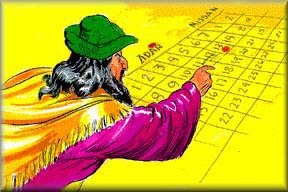
Throughout the Bible we see that there is hostility between the lineage of the Promised Messiah (the seed of the woman, the virgin born Christ, who would be a descendant of David and Abraham) and the seed of the serpent (Satan who is actively at work through principalities and powers).
Genesis 3:14-15 14 The LORD God said to the serpent, “Because you have done this, Cursed are you more than all cattle, And more than every beast of the field; On your belly you will go, And dust you will eat All the days of your life; 15 And I will put enmity Between you and the woman, And between your seed and her seed; He shall bruise you on the head, And you shall bruise him on the heel.”
Earlier in our reading of the Old Testament we saw how this spiritual war was on display when Amalek, a descendant of Esau, attacks the vulnerable children of Israel at Rephidim!
Deuteronomy 25:17-19 17 “Remember what Amalek did to you along the way when you came out from Egypt, 18 how he met you along the way and attacked among you all the stragglers at your rear when you were faint and weary; and he did not fear God. 19 “Therefore it shall come about when the LORD your God has given you rest from all your surrounding enemies, in the land which the LORD your God gives you as an inheritance to possess, you shall blot out the memory of Amalek from under heaven; you must not forget.
But God’s people do forget. There is a practical application here: We think we know better. We compromise our obedience. We spare Agag, who represents the ways of the flesh. We forget we have been given instruction to mortify the flesh (Romans 8:13; Colossians 3:5). We forget that we are in a battle (Ephesians 6:12). We don’t always recognize the forces that oppose the Promise. King Saul thought far too much of himself and far too little of God’s commands and promises.
What about us?
Now Mordecai, a descendant of King Saul, faces Haman, a son of King Agag. He is face to face with the enemy.
Mordecai does not deal with Haman by the sword or with his own strength, but he resists Haman’s authority, standing firm on what God has said. Then, in humility, sackcloth and ashes, he appeals to God with fasting, weeping, and wailing. It is implied, though not explicitly stated, that Mordecai has hope that deliverance will come from the Lord God somehow, no matter what, according to His promise to Abraham, that his seed would be preserved to bring blessing to all nations.
Mordecai appeals to Esther, asking her to seize the opportunity given to her by her royal position as Queen and go before the King and plead for her people.
Esther must count the cost. Will she stand true to the Promise of her heritage as Hadassah the Jew, or will she hold back in the interest of self-preservation and worldly satisfactions as Esther, the Queen?
Esther 4:14 14 “For if you remain silent at this time, relief and deliverance will arise for the Jews from another place and you and your father’s house will perish. And who knows whether you have not attained royalty for such a time as this?”
What about us? Are we willing to take up our Cross and stand true to the Gospel? Listen to the words of Jesus:
Luke 9:23-25 23 And He was saying to them all, “If anyone wishes to come after Me, he must deny himself, and take up his cross daily and follow Me. 24 “For whoever wishes to save his life will lose it, but whoever loses his life for My sake, he is the one who will save it. 25 “For what is a man profited if he gains the whole world, and loses or forfeits himself?
Up until this point, Esther is on the receiving end of other people’s counsel. Now she decides to identify with her people and make whatever sacrifice is required of her. From here on in Esther is seen taking authority and gives the instructions. She is truly acting as Queen.
As Christians we have been given royal status (1 Peter 2:9; Revelation 1:6) and act as His agents in the world. We will be called to rise to the occasion and act on His behalf, even when it costs us.
Luke 10:19 19 “Behold, I have given you authority to tread on serpents and scorpions, and over all the power of the enemy, and nothing will injure you.
Esther 4:15-16 15 Then Esther told them to reply to Mordecai, 16 “Go, assemble all the Jews who are found in Susa, and fast for me; do not eat or drink for three days, night or day. I and my maidens also will fast in the same way. And thus I will go into the king, which is not according to the law; and if I perish, I perish.”
Esther 4:17 17 So Mordecai went away and did just as Esther had commanded him.
Esther’s fasting for ‘three days and nights’ is a picture of her dying to self. It is interesting how according to the Jewish reckoning of time, Esther’s “three days, night or day” (Esther 4:16) is consistent with Esther taking action “on the third day” (Esther 5:1). This may give some light on how Jesus’ prophecy of His death, burial and resurrection fulfills the sign of Jonah’s “three days and nights” in the belly of a large fish (Jonah 1:17; Matthew 12:40) and Jesus rising ‘on the third day’ (Matthew 16:21; 17:23; Matthew 20:19, Luke 9:22, 24:7, 46. There is evidence in ancient documents that in the Hebrew culture the phrases ‘three days and three nights’, ‘three days, night or day’ and ‘on the third day’ refer to an equal time span.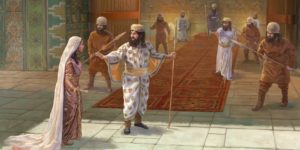
On the third day Esther rises and makes a bold approach to address the King, not that she had any right of her own to do so, but appealing to the golden scepter of the King’s mercy.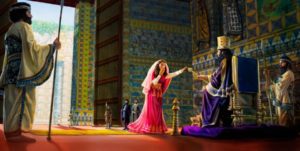
The golden scepter is extended to her and she is shown favor. She intercedes. But to the reader’s surprise, it is not yet for her ultimate request. She does not yet ask for the deliverance of her people. We are not told why. The timing is not right? Hearts needed to be prepared? God knows when we don’t know. And that is one of the main points of the book. God has His hidden purposes, even when what ‘happens’ in our lives seem mysteriously inexplicable at the time. The hidden wheels of providence are working in the background and ultimately advance God’s purposes.
Romans 8:28 28 And we know that God causes all things to work together for good to those who love God, to those who are called according to His purpose.
Esther’s first request is that the King and Haman join her for a banquet.
Haman is thrilled that he has the Queen’s attention, as well as the King’s, and gladly attends her banquet. When the King asks what the Queen’s request might be, once again the Queen seems to put the big request ‘on hold’. She asks that the King, and Haman, attend a second banquet.
While Haman’s pride is fed at the first banquet, Haman is once again irritated when he sees Mordecai, who continues to shame him by stubbornly refusing to bow.
He complains to his wife, Zeresh, and his friends, that Mordecai continues to snub him in public. Zeresh and friends suggest that he need not ruin his royal banqueting with the bothersome thoughts of Mordecai’s stiff-necked refusal to bow. Zeresh suggests Haman builds a gallows 75 feet tall and hang Mordecai on it. Haman enthusiastically concedes to this plan.
Somehow, Mordecai’s identity as a Jew is hidden from Zeresh. Esther’s identity as Mordecai’s cousin, and a Jew, remains hidden both to Haman and her husband, Xerxes.
The central climax of the Book takes place between Esther’s first banquet (5:1-8) and the second banquet (7:1-9). It is then that Xerxes has his sleepless night and discovers that he failed to honor his savior, Mordecai. It is then that Haman builds his gallows, and in the early hours of the next day, goes to the King to get permission to hang Mordecai upon it. It just ‘happens’ that Haman is on his way to see the King, when the King is needing the advice of his most trusted counselor. The King asks Haman, “What is to be done for the man whom the King desires to honor?” Haman, imagining that this hypothetical question refers to the King’s desire to honor himself, asks for the highest possible honors the King has at his disposal- the King’s robes, the King’s horse, and the King’s authority to be given to the man whom he desires to honor. He suggests that the King’s nobles escort him on parade throughout the city.
To Haman’s surprise, the King tells Haman to do all that he has proposed for the honor of Mordecai. He is to leave no detail undone. This is where the tables start turning. And the treatment that Haman desired for the Jews begins to fall on him. Haman is shamed once again.
When Haman’s friends and his wife hear of this, they predict his downfall.
After Haman has been walking alongside Mordecai, who is riding the king’s horse in a parade given in his honor, he returns home dirty, disheveled and humiliated, just in time to have the King’s servants call him away to the Queen’s second banquet.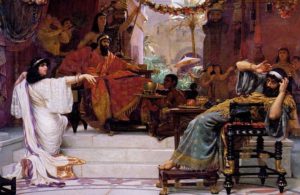
It is at the second banquet that Queen Esther makes her ultimate request. She asks the King to spare her life and that of her people. Xerxes is bewildered. Who are her people? Who has threatened the life of the Queen? Who could have plotted such evil? Esther exposes Haman as the author of the edict calling for her death and the death of all Jews.
The king gets up in a rage and exits briefly into the palace garden. Haman is terrified and begs Esther to spare his life. In doing so, he falls upon the couch where she is reclining.
As the King returns it appears that he is molesting the Queen. The King is outraged that Haman would dishonor him by attacking his wife. (It is an insight on the incurable wickedness of the human heart, that Xerxes seems more bothered by this dishonor than the prospect of the Jewish people being annihilated). He summons his guards who cover Haman’s head. Then Harbona, one of the King’s eunuchs, advises the King that quite conveniently he could hang Haman on the very gallows that Haman had prepared for hanging Mordecai.
Esther 7:10 10 So they hanged Haman on the gallows which he had prepared for Mordecai, and the king’s anger subsided.
This is a prophetic picture of God’s justice being satisfied when the reign of sin (Haman) is put to death on the cross. He who knew no sin (Christ) willing allowed himself to be judged and penalized as sin, while Himself remaining sinless. This fact is vindicated by the resurrection (Psalm 16:10). At the cross, the tables are turned on the enemy (Hebrew 2:14-15). Virtue is ultimately rewarded, and vice is punished.
1 Corinthians 2:7-8 7 but we speak God’s wisdom in a mystery, the hidden wisdom which God predestined before the ages to our glory; 8 the wisdom which none of the rulers of this age has understood; for if they had understood it they would not have crucified the Lord of glory
TODAY’S READING FROM THE NEW TESTAMENT – 1 CORINTHIANS 12:1-26;
“12 and 4”. That is how you can remember the location of the chapter numbers in the New Testament that address the subject of spiritual gifts: Romans 12 and 1 Corinthians 12. Ephesians 4 and 1 Peter 4.
Today’s reading covers Paul’s teaching on the inter-dependence of each member’s gifted-ministry in the body of Christ. The Holy Spirit distributes spiritual gifts sovereignly, “just as He wills” (1 Corinthians 12:11). The eye cannot say to the hand, I have no need of you. Let us appreciate the variety of gifts and ministries in the body of Christ.
Paul reminds the Corinthians that they need discernment. In the past they were led astray by false temple-oracles to worship idols. Don’t be led by mere impressions or feelings. We must cling to God’s Word and the preeminent truth that Jesus is Lord.
Spiritual gifts are not to be prostituted for the glory of self, a group, or a cause, but only used for the glory of God and the good of others.
1 Corinthians 12:7 7 But to each one is given the manifestation of the Spirit for the common good.
The body of Christ, in its local expression, is to function as a unit, with every member appreciating the unique contributions that other members make that benefit the body as a whole.
TODAY’S READING FROM THE BOOK OF PSALMS – PSALMS 36:1-12
Psalm 36 verses 1- 4 describe the life of the person who gives no regard to God’s self-revelation in His Word. They are not in a right relationship with God (this is called wickedness in the Bible). There is no fear of God, no sense of His presence, His holiness, and their ultimate accountability to Him.
This person is self-deceived (36:2). His speech is unwholesome, he is foolish in his thinking and lacks wisdom for his decisions. He gives in to the patterns of the flesh and does not reject what is wrong.
In contrast to man in his corruption, the Psalmist pictures God in His faithfulness. His love is steadfast and together with His faithfulness reaches to the skies. The majesty of His righteousness is likened to the mountains. The greatness of His justice is likened to the vastness of the seas.
God mercifully provides rescue and refuge. (v. 6-7).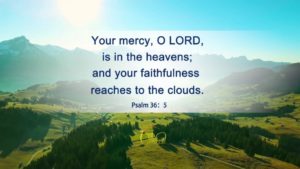
Psalm 36:9 9 For with You is the fountain of life; In Your light we see light.
Is that not true? By His light we see all things. The light of His Word illuminates our perception of everything else.
The Psalm ends with a prayer.
Psalm 36:10-12 10 O continue Your lovingkindness to those who know You, and Your righteousness to the upright in heart. 11 Let not the foot of pride come upon me, and let not the hand of the wicked drive me away. 12 There the doers of iniquity have fallen; They have been thrust down and cannot rise.
TODAY’S READING FROM THE BOOK OF PROVERBS – PROVERBS 21:21-22
Proverbs 21:21-22 21 He who pursues righteousness and loyalty finds life, righteousness and honor. 22 A wise man scales the city of the mighty and brings down the stronghold in which they trust.
What strongholds has the enemy established in your life that need to come down? How is your pursuit of God’s kingdom and righteousness? Is it loyal?
PRAY FOR THE NATIONS- MADAGASCAR
This land of riches fights a battle with poverty. Some call Madagascar the “8th continent”. Its rich environment houses unique plant and animal species, and a unique mix of ethnicities. But most people live on an average of less than $1 US/day. The slash-and-burn farming technique destroyed about 80% of the rainforest cover and many species of plants and animals. Pray for leadership that will serve the people well, and development that lifts people out of poverty.
Madagascar
Republic of Madagascar
Africa
Geography
Area: 587,041 sq. km
The world’s 4th largest island 1,600 km long in the Indian Ocean 600 km off the coast of Mozambique; a great degree of flora and fauna is unique to Madagascar.
Population: 20,146,442 Annual Growth: 2.72%
Capital: Antananarivo
Urbanites: 30.2%
HDI Rank: 145 of 182 (UN Human Development Reports 2009)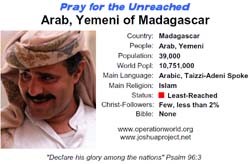
Peoples
Peoples: 41 (27% unreached) All peoples
Unreached Peoples Prayer Card
Official language: Malagasy, French and English (though not widely used) Languages: 20 All languages
Religion
Largest Religion: Christian
|
Religion |
|
Pop % |
Ann Gr |
|
10,784,390 |
53.53 |
3.0 |
|
|
2,310,539 |
11.5 |
3.5 |
Challenges for Prayer
Madagascar is locked in a battle with poverty, even though it is often called the “8th continent” and is rich in ecology, ethnicity and history. The majority live on an average of less than $1US/day and survive by subsistence agriculture. The common slash-and-burn technique is destroying the rainforest cover as well as many unique plant and animal species. About 80% of the original rainforest cover has already been lost. Repeatedly, cyclones further hamper development and destroy property. Pray for appropriate and sustainable development that lifts people out of poverty, and for a long-term approach to this complex challenge.
Christian support ministries. Pray for increased impact of the following:
- a) Aviation ministry. Because much of the land is inaccessible, the ministry of MAF and Helimission is very strategic in flying workers and supplies to the places of greatest need. MedAir and several secular aid agencies benefit from these organizations.
- b) Bible translation. The Protestant Malagasy Bible has been available since 1836. A revised modern version, using more current Official Malagasy, has been produced by various collaborating denominations. Currently, only the official Merina dialect has the Bible; translation work is ongoing in 10 different Malagasy languages. The Bible Society (UBS) has a widely recognized ministry and a vigorous distribution program, but lack of foreign exchange limits importation and printing of the Scriptures. The Children’s Bible is also a popular resource as is the Bible on mobile phone; a high proportion of Malagasy use mobile phones routinely.
- c) Christian literature is in short supply. There are few good spiritual books in Malagasy. The Lutherans and Catholics have printing presses, but they badly need modernizing. Quality Christian material that speaks to the Malagasy mindset is also needed.
- d) Audio Scriptures are vital in a country where literacy is below 50% and functionally as low as 30%, which makes all the more valuable resources such as FCBH and audio teaching in 13 languages on offer through GRN, GNM and UBS.
- e) Christian radio. Christian programs such as those by UBS and SU are regularly aired on national and many local FM stations in the larger urban centers, but organization and consistent quality programs remain a need. Avotra, a local ministry, has a radio station in Nosy-Be with good local impact. HCJB has helped to set up a number of the FM stations in different parts of the island. Both TWR and the Adventists broadcast in Plateau Malagasy. Most crucial is providing isolated rural peoples with radios and radio transmissions that reach them; the cities are well covered already.
- f) The JESUS film is now available in seven languages, the result of recent translation work. Five more are in progress. Pray for its effective use.
PRAYER: We are reminded of Your Supreme Sacrifice, O God, in that Your Son came to die and deliver us from the sentence of death. It was not a question of, “If I perish, I perish,” but He knew His death was certain, He willingly offered Himself to perish as our Substitute that we should not perish. In doing so, He satisfied Your Justice and establishes peace. Give us the courage through the Holy Spirit to step out in loyalty to Christ and for the benefit of others. When a chance for deliverance exists, and there are evils that we can resist, help us to take the risk for such a time as this! In Jesus’ Name. Amen
-Pastor David
